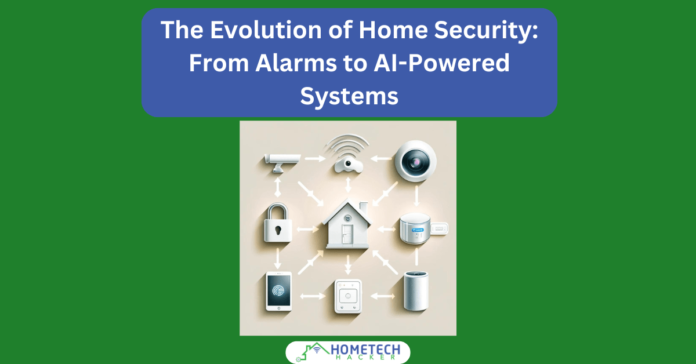
Home security has come a long way from the days of simple locks and alarms. With the rapid advancement of technology, we now have access to sophisticated AI-powered systems that not only keep our homes safe but also offer a level of convenience and peace of mind that was once unimaginable. In this article, we’ll take a journey through the evolution of home security and explore how artificial intelligence (AI) is revolutionizing the way we protect our homes.
This page contains affiliate links. If you purchase an item using an affiliate link I will receive a small commission at no cost to you. Affiliates do not influence my recommendations. Read my disclosures for more information.
The Early Days: Locks and Basic Alarms

In the early days of home security, the primary means of protection were mechanical locks and basic alarm systems. These systems were simple but effective, providing a deterrent to would-be intruders. Mechanical locks, while still essential today, have evolved significantly in terms of design and functionality.
Basic alarm systems, which were introduced in the mid-20th century, added an extra layer of security. These systems typically consisted of sensors on doors and windows that would trigger an audible alarm if breached. While these alarms served as a deterrent and alerted homeowners to potential threats, they had their limitations, such as false alarms and limited notification capabilities.
The Digital Revolution: Electronic and Smart Security Systems

The advent of digital technology brought about significant changes in home security. Electronic security systems, such as CCTV cameras and advanced alarm systems, became more accessible to the average homeowner. These systems provided better monitoring and recording capabilities, allowing homeowners to keep an eye on their property remotely.
With the rise of the internet and smart home technology, security systems have become even more integrated and intelligent. Smart security systems allow homeowners to control and monitor their security devices through smartphones and other connected devices. Features like real-time notifications, remote access, and integration with other smart home devices became standard. HomeTechHacker published an article about how smart homes improve safety and security that illustrates this revolution even more. He also credits home security as the reason he got into smart home tech in the fist place.
Editor’s Note: If you are looking for a good security camera to add to your home security system, check out HomeTechHacker’s Wi-Fi Surveillance Camera Advisor for personalized recommendations.
The AI-Powered Era: Advanced Security Solutions

The most significant leap in home security has come with the integration of artificial intelligence. AI-powered security systems leverage machine learning algorithms, computer vision, and other advanced technologies to provide a level of security that goes beyond traditional methods.
- Facial Recognition: One of the most exciting advancements in AI-powered security is facial recognition. This technology allows security systems to identify individuals based on their facial features. For example, an AI-powered doorbell camera can recognize family members and trusted visitors, while alerting homeowners to the presence of unknown individuals. This not only enhances security but also adds a layer of convenience by automating access control.
- Real-World Example: The Nest Hello doorbell uses facial recognition to distinguish between familiar faces and strangers. When someone approaches the door, the system can send a notification to the homeowner’s smartphone, providing real-time information about who is at the door.
- Behavioral Analysis: AI-powered security systems can also analyze behavioral patterns to detect unusual activity. By learning the typical behavior of residents, these systems can identify anomalies and alert homeowners to potential threats. For instance, if an AI-powered camera detects movement in restricted areas or at unusual times, it can trigger an alert.
- Real-World Example: The Arlo Ultra security camera uses AI to distinguish between different types of motion, such as people, animals, and vehicles. It can also learn the usual activity patterns in a home and notify homeowners of any deviations.
- Predictive Analytics: Another powerful application of AI in home security is predictive analytics. By analyzing historical data, AI systems can predict potential security threats and take proactive measures. For example, an AI-powered security system can identify patterns that indicate a higher likelihood of a break-in and adjust security protocols accordingly.
- Real-World Example: Deep Sentinel uses AI to predict and prevent crimes before they happen. The system continuously analyzes video feeds from security cameras and uses predictive algorithms to detect suspicious behavior. If a potential threat is identified, the system alerts human guards who can intervene in real time.
The Importance of AI in Home Security
AI has transformed home security by making systems more intelligent, responsive, and efficient. Here are a few reasons why learning about AI and its applications in home security matters now:
- Enhanced Protection: AI-powered systems offer superior protection by accurately identifying and responding to potential threats. They reduce the chances of false alarms and provide more reliable security.
- Convenience: With features like facial recognition and behavioral analysis, AI-powered systems automate many aspects of home security, making it easier for homeowners to manage and monitor their property.
- Cost-Effective: While advanced security systems may have higher upfront costs, their ability to prevent incidents and reduce false alarms can save homeowners money in the long run.
- Future-Proofing: As AI technology continues to evolve, staying informed about its applications in home security ensures that you are prepared for future advancements and can make the most of innovations.
Editor’s Note: Be sure to check out HomeTechHacker’s article about why it is important to learn about AI.
Learn More About AI and Home Security
If you’re intrigued by the potential of AI in home security and want to dive deeper into its applications, consider enrolling in the following HomeTechHacker Academy courses:
These courses provide comprehensive insights into how AI can transform your home security setup and introduce you to the tools and techniques needed to harness the power of AI in your daily life.
Final Thoughts
The evolution of home security from simple alarms to AI-powered systems highlights the incredible advancements in technology and their impact on our daily lives. By understanding and embracing AI, homeowners can enhance their security, enjoy greater convenience, and stay ahead of potential threats. As AI continues to shape the future of home security, there’s no better time to start learning about its capabilities and applications.
Interested in supporting HomeTechHacker?
Have you found the content on this site useful? If so, are you interested in supporting me and this site? There’s no obligation of course, but I would really appreciate any support you can give. Below are a few ways you can show support:
Thank you! I really appreciate it!



